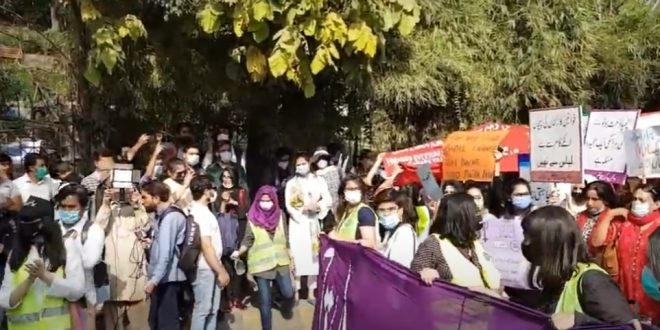Mehmood Ghaznavi remembers rejecting the case of a Pakistani Christian girl converting to Islam for marriage four years ago.
“She knew nothing about Kalma [the Islamic proclamation of faith], there was no inspiration. I suggested she study the Quran and the life of the Prophet Muhammad before marrying her Muslim boyfriend. She never returned,” said Ghaznavi, who chairs the National Peace Committee, an interfaith group.
“Although there is no age limit for conversion to Islam, we reject first marriages without consent from the parents. Disagreements can be handled with grace.”Subscribe to your daily free newsletter from UCA News
The cleric was speaking on March 8 at the protest camp of Rawadari Tehreek (Movement for Tolerance) in front of Lahore Press Club. More than 100 people, including Christians and Muslims, attended the camp to mark International Women’s Day.
They carried placards stating “Save our daughters” and “Save us.” The speakers demanded legislation to stop forced religious conversions and expressed solidarity with the victims of forced conversions.
According to the Lahore-based Centre for Social Justice, 162 cases of questionable conversions of minority girls were reported in Pakistan’s media between 2013 and November 2020. More than 54 percent of victims (girls and women) belonged to the Hindu community, while 44 percent were Christians.
More than 46 percent of victims were minors, with nearly 33 percent aged 11-15, while only 17 percent of victims were above 18.
Last month Faisalabad Session Court ordered the release of Christian teenager Farah Shaheen, who was abducted, forcibly converted to Islam, married to a 45-year-old Muslim man and later moved to a government-run shelter. She rejoined her family on Feb. 16.
Samson Salamat, chairman of Rawadari Tehreek, labeled the case as an example of “love jihad” — the practice where Muslim men target non-Muslim women for conversion to Islam by means such as seduction and feigning love.
“Clerics in every street are ready to solemnize such marriages with fake certificates. Unfortunately, hundreds of girls belonging to religious minorities are being abducted, forcibly converted and then married off to their abductors every year,” he told UCA News.
“Love jihad is indeed an extremely serious problem being ignored by the state machinery, parliament, political parties and other stakeholders, which has nurtured a sense of insecurity among minorities.
“If someone dares to table any bill, it is immediately rejected. The moves to pass legislation to discourage and stop forced conversions and unsolicited marriages have already been struck down in Sindh Assembly and the National Assembly in the past. Sadly, legislation has yet to be initiated in other provinces.”
The term “love jihad” caught the public attention for the first time in 2009 in India when website hindujagruti.org claimed that an organization called Muslim Youth Forum had put up a poster regarding the practice, which entailed “trapping” Hindu girls in love with the aim of converting them for marriage.
Bharatiya Janata Party-ruled Uttar Pradesh state in northern India has cleared a draft ordinance to deal with religious conversion via marriage. The ordinance, approved on Nov. 24 by Chief Minister Yogi Adityanath and his cabinet, stipulates a jail term of up to 10 years for those found guilty.
In Pakistan, according to Section 498 B of the Prevention of Anti-Women Practices Act, 2011, the punishment for forced marriages is a jail term of 3-10 years and a fine of 500,000 rupees (US$3,180). However, church activists say the law remains dormant and ignored by both law enforcement agencies and families of victims.
A manifesto for women
The Feminist Manifesto of the Aurat (women) March Lahore called for political and societal action.
“We assert that emotional and psychological abuse be recognized as a form of violence. The state must also recognize that societal, structural and institutional practices against women such as honor killings, marital rape/abuse, harassment, forced childhood marriages, gendered violence, forced conversions, religious and ethnic discrimination traumatize women and gender minorities,” it stated.
“This is both an individual and collective trauma. It is crucial to recognize the damage these practices cause and utilize structural mechanisms to eliminate them from our society.”
According to Reverend Saleem Khokhar, a member of Rawadari Tehreek, several members of the church-run interfaith group also oppose legislation against forced conversions.
“Instead of focusing on fundamental human rights, they link every issue with faith. Despite wearing our signature saffron scarves [the color of saints], they reject being our members. Forced conversions and marriages are often condoned by local police and union councils who turn a blind eye, often complicit in falsifying documents,” he said.
“The clerics ignore laws on marriage restraints. The majority of the clerics hold puberty as the threshold. Marriages by conversions mostly fail. We are campaigning to educate Christian families about the side effects of such marriages that only survive for four or five months. Minority girls are then thrown away like used tissue paper.”
The Child Marriage Restraint Act, 1929, mandates that girls cannot marry before the age of 16 and boys must be 18 or older. However, in Sindh province, the local government raised the age to 18 for both sexes in 2014, with child marriage made a punishable offense.
 Eurasia Press & News
Eurasia Press & News



